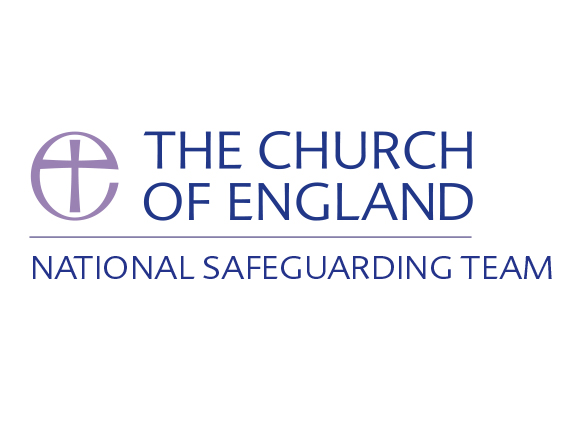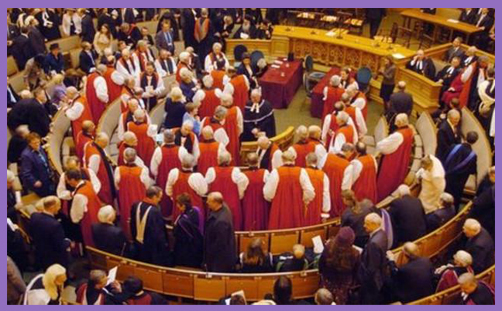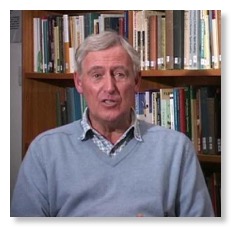I have had in mind to write an idiot’s guide to the byzantine complexities of the Church of England’s safeguarding institutions. I recently received this anonymous letter from the future explaining with great clarity the way that the Church in 2025 proposes to deal with bishops and clergy who go astray in some way. The consequence of entering into the processes of church discipline will have the result of driving everyone involved into a state of complete bewilderment and despair. We can hope that decisions made in 2020 will prevent this Kafkaesque future coming to pass. We still have five years to get things right! Surviving Church identifies with the sentiments of this letter but it was written by a contributor, not the Editor.

The National Safeguarding Team
Lambeth Palace, London SE1 7JU
April 1st 2025
Dear Bishop,
As you will be aware, the role of the National Safeguarding Team (NST) has broadened over the last year, following amendments made to the Clergy Discipline Measure of 2003. Our remit now covers all areas of safeguarding, including any sensitive spheres relating to the conduct of clergy, if it is alleged that they might pose a risk to the health, safety, security and wellbeing of any member of the public who might feel endangered.
We are writing to let you know that we have received a number of complaints about your driving from one of your neighbours, and who also represents your Neighbourhood Watch. You have been seen driving erratically on several separate occasions. A couple of times on your own, early in the morning. Twice at night, late, returning home. And on at least two occasions, driving near children who were on their way to school. Your neighbour has strong reasons to believe that you are driving whilst under the influence of alcohol, and that you might pose a danger to the public, and may inadvertently cause injury to someone. Or worse, be responsible for a fatality.
Obviously you will understand that the Church of England cannot afford to be seen condoning senior clerics who might be intoxicated whilst driving. We are all aware of what a serious public concern drink-driving constitutes. We have therefore convened a Core Group to investigate this matter. We have taken seriously the representations of your neighbours. We have also looked into your drinking habits (e.g., dinners, events, receptions, etc.). We have also checked with the police and the relevant local traffic monitoring bodies to see if you had been caught speeding recently, or driving dangerously. No offences have been reported to the police, to date. Your Neighbourhood Watch has not reported you to the police either, pending the outcome of our enquiries.
However, on the basis of your neighbour’s reported concerns, you will understand we are obliged to investigate such matters. We therefore ask you to refrain from driving anywhere for the moment – either by yourself, or in carrying any passengers, especially children. If you need to get anywhere by car, someone else must drive. You cannot be in a car on your own, and must always be accompanied in a vehicle. For the time being, you should not attend any event at which alcohol might be served, or to place yourself in any situation in which alcohol might be offered to you. We also ask you to surrender your driving licence for the time being, until our investigations are completed. Please do not attempt to contact any of your neighbours, your Neighbourhood Watch group, or anyone who has been a previous neighbour of yours. Should any of them contact you, please refer them directly to us.
The person to manage the investigation has already been appointed, and begun their work. We hope that this process can be completed as soon as possible. We have allocated you a support person to help with any pastoral needs you may have during this time. You may also nominate an advocate on the Core Group for when it next convenes, but there is no date for that yet. Unfortunately, we were unable to find an advocate when we originally met and set our terms of reference for the process. Sometimes when convening a Core Group, the person under investigation would not initially be offered an advocate, or even told they might need one (because they may not) until the nature of the accusations are clarified. This protects complainants, NST and the confidentiality of the process. Our investigation strives to be fair and balanced, so you can be reassured that you will not be placed at any disadvantage by this. You may nominate a suitable friend or a colleague for the Core Group; but not a lawyer, as that is against our Guidelines.
Under the terms of reference for the investigation, we will begin to interview your neighbours, people you drink with when at formal and informal events connected with your duties and role, and also socially. We will interview people you have driven, or have seen you drive. We will want to pull together a balanced picture of how your drinking and driving might be connected. In this, please be assured, there is no suggestion that you have a specific problem with alcohol, or are an alcoholic. We will obviously consult with the police and the highways authorities to check on driving movements after you have attended official and social events that have involved the serving of alcohol. We may need to have access to your medical records.
We cannot release the minutes, findings and conclusions of the first Core Group meeting. They are confidential to the Core Group, whose membership we cannot disclose. However, we believe that the concerns of your neighbours have met the threshold for implementing our investigation. You are therefore asked to agree to this joint media statement:
“A complaint against the Bishop has been raised by individuals and an organisation in respect of allegations of drink-driving. The matter will need to be formally investigated by the NST, and until the investigation is complete, the Bishop will not be driving, or attending any event or gathering at which alcohol may be served. The Bishop has agreed to cooperate fully with the NST and its enquiries, and no further media statement will be made by either party until the investigation is completed”.
At the conclusion of this investigation there are a range of possible outcomes. In some cases, the findings can lead to you losing your licence and being banned from driving for life, or for a shorter period of five years. You could be asked to re-take your driving test, or attend some mandatory driving course, after which you will be further risk-assessed. There might be penalties and/or restrictions attached to your driving licence, which, subject to continued compliance with the conclusions of the NST investigation, might be removed at a later date, yet to be determined. If alcohol abuse does emerge as an issue, we may require you to undertake counselling or some remedial medical treatment to address the cause and effect of excessive alcohol consumption.
Failure to comply with the NST’s investigation and the normative conditions attached to it, and as spelt out in this letter, will result in an automatic CDM being issued. If the investigation discloses offences and misconduct that are serious, a CDM process will also be implemented. In some cases, offences can lead to a prison sentence (which triggers an automatic CDM), though in this instance, your neighbour did not indicate that you had committed any criminal act. However, I you will be relieved to learn that the investigation, just to be sure, will also cover this ground.
If you have any questions, we will try to deal with these as best we can. But please note, we do not enter into correspondence or negotiation with any individual who is under investigation, once the Core Group has met, and the terms of reference have been set. These, as you know, were agreed last week, and that is why we are writing to you, in order to inform you of these.
The Lead Investigator will be in touch soon. As this is a confidential matter, we do not permit you to discuss this with any other person, and you may only refer to the agreed statement between us in the event of any media or any other enquiries. Please be assured that your voluntary withdrawal from driving, social events at which alcohol is served, and other gatherings, is an entirely neutral act, and implies no guilt on your part.
Yours sincerely, The NST.
Appendix
We are aware that some people receiving a letter from the NST without any warning may initially find the contents disturbing. Your allocated pastoral support person has been provided to help with any concerns you may have. We have also produced this brief list of Frequently Asked Questions (FAQs), and we anticipate that the answers to these FAQs will help to allay any misgivings you might have about the process you have now begun.
- Who will pay my legal fees?
This is not a legal process, so there should be no legal expenditure that you need to meet. We cannot be held responsible for any legal fees you may decide to incur.
- Should I get some legal representation, just in case I need support?
There is no need, as the NST, Core Groups and Investigators do not usually consult with lawyers during an investigative process and when making determinations.
- Am I on some kind of a Trial?
No. The NST, Core Group and our Lead Investigators do not have a role in establishing your guilt or innocence. Our role is to find out what has happened, and what or who may be at fault. Once the investigation is concluded, it may be that the recommended decision of the Core Group is loss of licence to minister, suspension, barring from ministry, or completely cleared. But this is not a trial, which is why you do not need legal support.
- What if the Investigation was or is being mishandled?
It won’t be. You should refer any concerns you may have to the NST. However, the NST cannot engage with individuals under investigation until a Core Group process is complete.
- What if I disagree with the decision or verdict you reach?
Our investigations are thorough, and we strive to be balanced and fair.
- Is there an Independent Chair I can appeal to?
The Independent Chair is only able to look at the processes, guidelines and their general implementation, and cannot comment or adjudicate on any individual cases. You can refer any of your concerns to the NST.
- Is there a right of appeal to any decision?
You can refer any concerns you have back to the NST, or refer the matter on to your Bishop or Archdeacon, unless they were involved in the original claim against you. If they were, then you may want to consider alternative avenues. We have provided you with an allocated pastoral support-person as a resource, who might be able to advise further.







